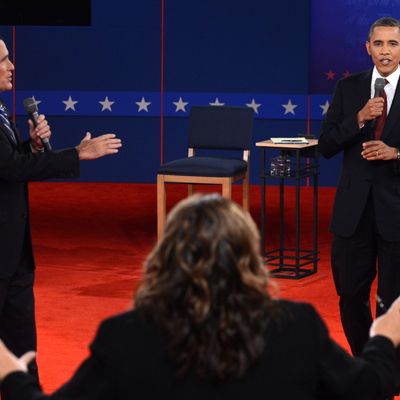
Liberals suffer from an earnest tendency to place inflated hopes in the power of truth-speaking journalists to solve our political dilemmas. The crusading journalist of the liberal imagination is a blend of nostalgia and fantasy, running from Edward R. Murrow denouncing Joe McCarthy and Walter Cronkite denouncing the Vietnam War to Will McAvoy. At the moment, this ideal has affixed itself upon the seductive notion that presidential-debate moderators ought to engage in real-time fact-checking. Hillary Clinton’s campaign is endorsing fact-checking, and Donald Trump’s is denouncing it, and the debate commission’s executive director insists moderators will not resolve factual disputes. This is a demand for the journalist to solve problems that exist in the political system.
The fact-checking controversy has revolved around Trump and his unusually flagrant lies. But it may be understood best in the context of two episodes from recent presidential-debate history. The first is the George W. Bush–Al Gore debates from 2000. The central policy question between the parties in that election was whether to continue Clinton-era domestic policies, or to reorient government policy around a large, regressive tax cut. The Bush campaign was keenly aware at the time that the American public sided with the Democrats on this question. As Karen Hughes recounts in Patrick Healy’s reconstruction of those fateful debates, “We faced a major challenge throughout the campaign: The American economy was going well; times were relatively good. We had to give people a reason to vote for change.”
Bush’s solution to this problem was twofold: He factually denied the fiscal and distributionary implications of his tax cut, and framed the public debate on personal character rather than policy. The debates proved decisive. Gore attempted relentlessly to pin down the math of Bush’s proposal, which overwhelmingly benefited the very rich. Bush presented Gore’s attempts to do so as a character flaw. (“Look, this is a man who has great numbers. He talks about numbers. I’m beginning to think not only did he invent the internet, but he invented the calculator.”) As Healy recounts, the news media took Bush’s side, focusing on Gore’s demeanor rather than the underlying facts. Throughout the three debates that year, moderators never allowed the underlying factual debate to be resolved. Republicans remember the 2000 debates as a political triumph, and Democrats recall it as a debacle.
The counterpoint to this episode is a 2012 debate between Barack Obama and Mitt Romney, when Romney accused Obama of failing to call the attack in Benghazi an act of terror in the immediate wake of the event. Candy Crowley, the debate moderator, pointed out that Obama had in fact done so. Crowley was correct, though conservatives responded apoplectically.
At the time, it was a triumphant moment for Democrats. But the Republican reaction suggests the party would never tolerate such a role by the media on an ongoing basis. In its contemporary form, the GOP exists within an epistemic bubble that creates its own reality and disregards the findings of mainstream experts in economics, science, and other fields. Conservative media nurture their own hothouse alternative reality and regard any challenge thereto as illegitimate. Conservatives created this alternate ecosystem precisely to insulate their side from scrutiny from journalists who were not working within the conservative movement. And the simple reality is that, if debates become forums for media to subject candidate claims to fact-checking by the standards of independent arbiters, Republicans will refuse to participate in them.
Now, perhaps you think that is the way it needs to go, and perhaps you imagine the GOP would pay a price for such a boycott. I don’t. The far more likely outcome is that any political cost associated with boycotting the debates would be brief, short-lived, and subsumed by ordinary partisan rancor, and the end result would be that presidential debates would simply disappear as an institution.
Fact-checking sounds attractive in the age of Trump. But presidential debates are an iterative game. Many liberals are enthusiastic for debates to be fact-checked not only because they believe it would serve the cause of informing the public, but also because they believe that informing the public would aid their own side. Republicans aren’t going to cooperate with that, and any momentary advantage gained by weaponizing debate moderators would be lost in the next round.
Fact-checking is a crucial and central role of journalism. But there is a place in the world for the two candidates to confront each other face-to-face before the public. Debates may not give Americans all of the information they need to make an informed choice. Nor, for that matter, will cable news. We have to accept the fact that there are some problems in the world from which the news media can’t save us.






























